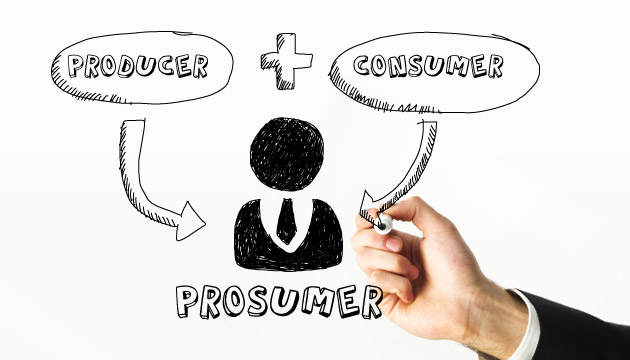Production? Consumption? Prosumption


Will you do us the honor and join our team of authors?
To write for the SohoBlog, contact us at [email protected]
(Shakespearean prose not required.)

PlanetSoho is about creating a new concept of commerce. It’s about trying to look differently at the way people interact when doing business. So here’s another new concept of the way information-age businesses operate. Ladies and gentlemen, I proudly present: the Prosumer - an acronym of producer and consumer.
The information age and the digital technology revolution of the end of the 20th century and the beginning of the 21st century, mark a paradigmatic shift in the way people discuss the world of commerce, production, marketing, advertisement, and consumption. We are now moving toward a more complex description of the concepts of production and consumption and moving away from the traditional dichotomy that distinguishes between the two. The emergence and availability of digital technologies, for example, cellular phones and the Internet, and the shift from a linear and hierarchical web (1.0) to a web based on user-generated content (2.0) - all reflect the emergence of a new world, which requires new and updated descriptive concepts.
In the year 1980, the futurist Alvin Toffler coined the phrase prosumer in an attempt to describe a new form of interactions and outcomes between traditional producers and consumers. Yet it took a decade and a half for this new concept to become common, with the shift from a linear and stable to a nonlinear and dynamic mode of exchange in which consumers are involved in the acts of production, marketing, distribution, and advertisement. This new economy is described by various names: “co-creation of value”; “Pro-Am”; “Wikinomics” and of course “prosumption” (check out Ritzer & Jurgenson great piece on the subject).
It was in the world of business where the idea of co-creation of value initially marked the need to integrate consumers in the acts of development, production, marketing, and advertisement, rather than in the act of consumption alone. Trends related to changes in consumer behavior, as well as the development of advanced technologies, demonstrated to producers the need - and the potential- in moving consumers from the realm of consumption into new domains. The relinquishment of absolute control over certain elements in the process of production, which had traditionally been exclusively in the hands of producers, was aimed to improve and adjust the fashion in which industries operate in a new and changing world.
Indeed, from a producer’s point of view, integrating consumers in the act of production reflects a new logic that aims to achieve the primary goal: maximizing profit. Yet the literature discussing the prosumer phenomena also tends to present prosumption in a more positive light, especially when looked at from the consumer’s point of view. Cooperation, self-expression, and even freedom are terms used to describe the new emancipating potential of the integration of consumers into production. Yet, from a more critical perspective, there are many who claim that the alleged emancipation and freedom are nothing but the continuation of exploitation through much more sophisticated means.
|
|
|